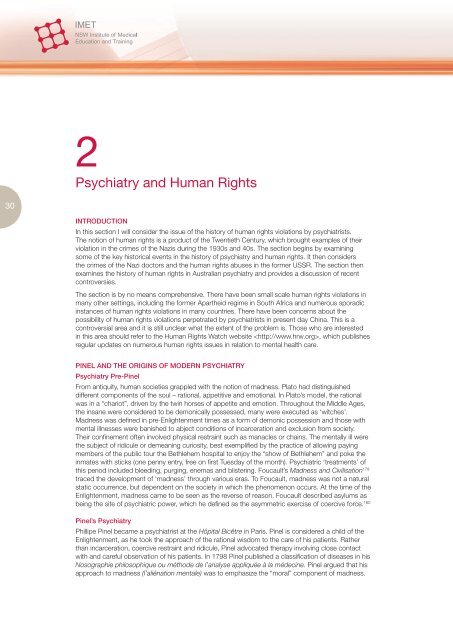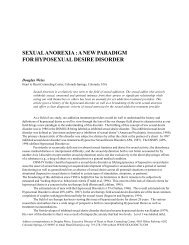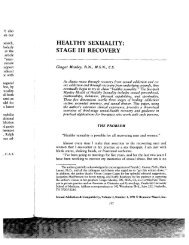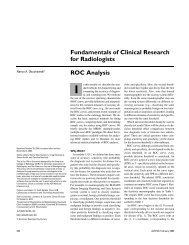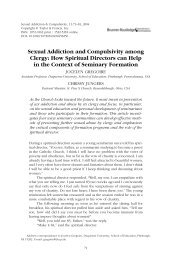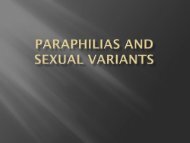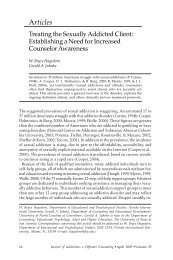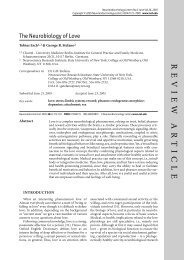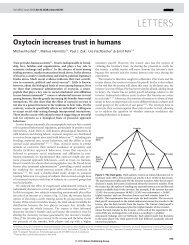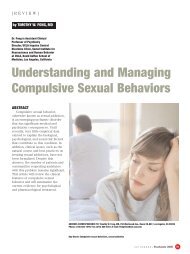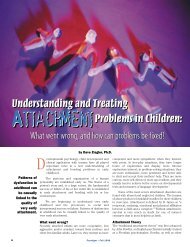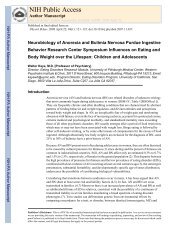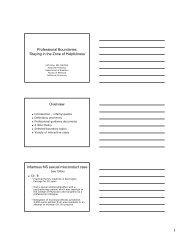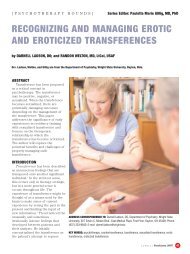2Psychiatry and Human Rights30INTRODUCTIONIn this section I will consider the issue <strong>of</strong> the history <strong>of</strong> human rights violations by psychiatrists.The notion <strong>of</strong> human rights is a product <strong>of</strong> the Twentieth Century, which brought examples <strong>of</strong> theirviolation in the crimes <strong>of</strong> the Nazis during the 1930s and 40s. The section begins by examiningsome <strong>of</strong> the key historical events in the history <strong>of</strong> psychiatry and human rights. It then considersthe crimes <strong>of</strong> the Nazi doctors and the human rights abuses in the former USSR. The section thenexamines the history <strong>of</strong> human rights in Australian psychiatry and provides a discussion <strong>of</strong> recentcontroversies.The section is by no means comprehensive. There have been small scale human rights violations inmany other settings, including the former Apartheid regime in South Africa and numerous sporadicinstances <strong>of</strong> human rights violations in many countries. There have been concerns about thepossibility <strong>of</strong> human rights violations perpetrated by psychiatrists in present day China. This is acontroversial area and it is still unclear what the extent <strong>of</strong> the problem is. Those who are interestedin this area should refer to the Human Rights Watch website , which publishesregular updates on numerous human rights issues in relation to mental health care.Pinel and the Origins <strong>of</strong> modern psychiatryPsychiatry Pre-PinelFrom antiquity, human societies grappled with the notion <strong>of</strong> madness. Plato had distinguisheddifferent components <strong>of</strong> the soul – rational, appetitive and emotional. In Plato’s model, the rationalwas in a “chariot”, driven by the twin horses <strong>of</strong> appetite and emotion. Throughout the Middle Ages,the insane were considered to be demonically possessed, many were executed as ‘witches’.Madness was defined in pre-Enlightenment times as a form <strong>of</strong> demonic possession and those withmental illnesses were banished to abject conditions <strong>of</strong> incarceration and exclusion from society.Their confinement <strong>of</strong>ten involved physical restraint such as manacles or chains. The mentally ill werethe subject <strong>of</strong> ridicule or demeaning curiosity, best exemplified by the practice <strong>of</strong> allowing payingmembers <strong>of</strong> the public tour the Bethlehem hospital to enjoy the “show <strong>of</strong> Bethlehem” and poke theinmates with sticks (one penny entry, free on first Tuesday <strong>of</strong> the month). <strong>Psychiatric</strong> ‘treatments’ <strong>of</strong>this period included bleeding, purging, enemas and blistering. Foucault’s Madness and Civilisation 179traced the development <strong>of</strong> ‘madness’ through various eras. To Foucault, madness was not a naturalstatic occurrence, but dependent on the society in which the phenomenon occurs. At the time <strong>of</strong> theEnlightenment, madness came to be seen as the reverse <strong>of</strong> reason. Foucault described asylums asbeing the site <strong>of</strong> psychiatric power, which he defined as the asymmetric exercise <strong>of</strong> coercive force. 180Pinel’s PsychiatryPhillipe Pinel became a psychiatrist at the Hôpital Bicêtre in Paris. Pinel is considered a child <strong>of</strong> theEnlightenment, as he took the approach <strong>of</strong> the rational wisdom to the care <strong>of</strong> his patients. Ratherthan incarceration, coercive restraint and ridicule, Pinel advocated therapy involving close contactwith and careful observation <strong>of</strong> his patients. In 1798 Pinel published a classification <strong>of</strong> diseases in hisNosographie philosophique ou méthode de l’analyse appliquée à la médecine. Pinel argued that hisapproach to madness (l’aliénation mentale) was to emphasize the “moral” component <strong>of</strong> madness.
Psychiatry and Human Rights2Madness needed to be seen in the context <strong>of</strong> the social and psychological factors affecting thepatient. Based upon post-mortem examinations, Pinel argued that there were organic causes tomadness, found in the gastrointestinal and peripheral nervous systems. As neurosyphilis was acommon cause <strong>of</strong> madness in the late Eighteenth Century, the Enlightenment methods <strong>of</strong> tissueexamination and pathological science were highly applicable to psychiatry.Pinel engaged in ”moral treatments”, involving ‘therapeutic’ conversations with patients, seekingto encourage them to withdraw from their delusional ideas. He attempted reform <strong>of</strong> the culture<strong>of</strong> asylums, choosing to involve patients in the daily life <strong>of</strong> the asylum and choosing his asylumattendants carefully. Despite the celebrated rationality <strong>of</strong> Pinel’s methods, he still partook inexercises <strong>of</strong> coercive power and his patients had little choice other than to cooperate with treatment.Moreover, Pinel continued to employ physical treatments such as baths, showers, opium, camphorand laxatives.31Norton Manning – The ‘Down Under’ Pinel?Frederick Norton Manning became medical superintendent <strong>of</strong> the Tarban Creek Lunatic Asylum(Gladesville Hospital) on 15 October 1868. Manning became immediately concerned about theisolation <strong>of</strong> patients from the rest <strong>of</strong> the community and described the hospital as “prison-like andgloomy”. Patients had inadequate facilities, monotonous and non-nutritious diets and little to occupythem. Manning described Tarban Creek as a “cemetery for diseased intellects”, set about minimizingthe use <strong>of</strong> restraint and provided resources for patient activities.In July 1876, Manning was appointed Inspector <strong>of</strong> the Insane with responsibility for all mentalinstitutions, except the Parramatta asylum for criminals (now Cumberland Hospital). He wasappointed Inspector-General <strong>of</strong> the Insane in 1879 and introduced a series <strong>of</strong> reforms to addressthe problems at the Parramatta asylum. Manning sought to engage the community in the treatment<strong>of</strong> mental illness by encouraging visits to the asylums (not in the vain <strong>of</strong> the Bethlehem visits) as wellas organizing many public discussions about the care <strong>of</strong> the mentally ill. Manning made frequentvisits to the UK to keep in touch with the advances in psychiatry and was particularly impressedwith a psychiatric institution being constructed at Chatham in Kent. Manning obtained copies <strong>of</strong> theconstruction drawings and agitated for a similar facility to be built. New psychiatric hospitals werethen constructed along similar plans at Callan Park and Goulburn. Manning oversaw pr<strong>of</strong>essionaldevelopment programs for staff in the hospitals and argued successfully for improvement in workingconditions. Along with John Cade (who described the therapeutic properties <strong>of</strong> lithium) Manning isregarded as one <strong>of</strong> the most important figures in the history <strong>of</strong> Australian psychiatry.The Crimes <strong>of</strong> the Nazi PsychiatristsOriginsPrior to Hitler’s ascent to power, German psychiatry was enamoured <strong>of</strong> eugenics, the removal <strong>of</strong>“inferior genetic stock” from the population. In 1913 German psychiatrist Alfred Ploetz foundedthe German Society for Racial Hygiene. <strong>An</strong>other psychiatrist, Ernst Rüdin, became his enthusiasticacolyte. Declaring racial hygiene a “spiritual movement,” Rüdin and his disciples aimed to propagatethe cause.Racial hygiene derives from Charles Darwin’s ideas about evolution, and the superiority <strong>of</strong> certainforms <strong>of</strong> the same species. Conflated with the ideas <strong>of</strong> Nietzsche and German Romanticism, thisbecame the basis <strong>of</strong> Nazi racial theory, where Jews, Slavs and coloured people were inferior toAryans. Amongst the Aryans, the mentally deficient or physically weak were inferior to the AryanÜbermenschen (supermen). Hitler came to power in Germany in January 1933. On July 4, 1933 the“Sterilization Act” became law, followed ten days later by the “Law for the Prevention <strong>of</strong> GeneticallyDiseased Children”. Four hundred thousand people, thought genetically inferior, were sterilized onthe orders <strong>of</strong> a network <strong>of</strong> over two hundred “Genetic Health Courts”. By 1936, many psychiatricpatients were being transferred from asylums to Dachau and other concentration camps.Aktion (Operation) T4In October 1939 Hitler ordered the killing <strong>of</strong> patients, or “inmates”, <strong>of</strong> German psychiatrichospitals. Aktion T4 was aimed at eliminating children suffering from “idiocy”, Down’s syndrome,IMET AN OVERVIEW OF PSYCHIATRIC ETHICS


